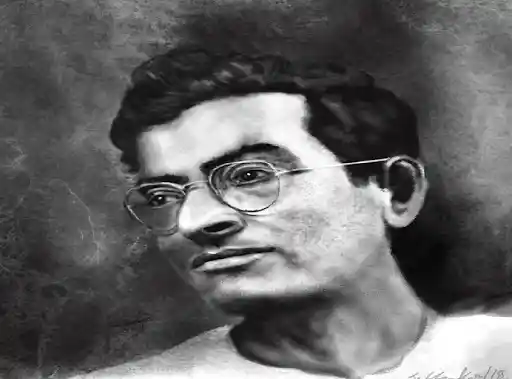Manik Bandhopadhyay: From Bet To Victory
After learning that editors of monthlies only publish well-known writers, a 20-year-old boy from Wesleyan Mission College in Bankura bet his friend that "my story will be published either in Bharatbarsha, Prabasi, or Bichitra within three months." Thus, this bet got the Bengali literary world another gem in the form of Manik Bandhopadhyay.

Manik Bandhopadhay; Image Source: Wikipedia
Oh, that Puppet's Tale? Manik Babu must have turned humans into puppets or made them slaves to fate then! Judges commented.
Manik: Those who understand and don’t judge me have kept this book alive for more than 20 years because they know this is not a revolution but simply a sympathetic protest against those who pull the strings to make people dance like puppets.
Manik Bandopadhyay, a writer wounded by critics who was bound to dismiss his novel because of its title as fatalist or feudalist. Manik's witty response clearly illustrates that the true mandate that an author requires is Readership, and the true commitment that an author seeks is engagement with society.
After he joined the Communist Party in 1944, his colleagues began sifting through his work for ideas that would undermine his political ideology.
Some people criticized Manik for giving too much room to cheap sensuality or romantic sensibility such as 'Putul Nancher Itikatha', possibly to titillate his readers. Other people claimed that Manik did not understand the concept of emancipation of labor because he relied on utopian visions like in 'Padma Nadir Majhi'. For them, Shashi, the protagonist in Putul Nancher Itikotha, is nothing more than a representative of the petty bourgeoisie, whereas Hossain Mia's island without religion in Padma Nadir Majhi is a place for slavery.
Indeed, despite being dubbed a champion of realism, Manik understands that the mimetic function of his narrative prose can only express a fraction of an individual's temporal experiences. It is impossible to retell and reconfigure reality in the way that a psychoanalyst such as Freud or a materialist such as Marx would. A writer has a plot in which he must populate his characters, as well as a storyline in which these characters must interact as individuals and as social beings. In Putul Nancher Itikotha, the narrator reveals, "It wasn't the beauty of the village made up of trees, houses, or ditches that Shashi was looking at; he looked around for people.”
He was a man of conviction, who knows what he is doing. He was a first-year Honours student at Presidency College when a failed writer friend challenged him to publish his work in a literary journal. Manik had received first divisions in both his matriculation and intermediate exams and was about to begin his Honours degree in Mathematics. When his friend blamed the system for not allowing aspiring writers like him, Manik simply retorted that his friend's writing might not be good enough. In response, his friend challenged him to have his work published. Manik accepted the challenge and showed up at the office of Bichitra, an acclaimed literary magazine, three months later.
Achintya Kumar Sengupta, the editor-in-chief and a member of the Kallol group, later recalled, "A dark lanky man came into our Bichitra office one day. 'I've brought a story,' he said. I instructed him to place it on the table. 'Take it,' he said, stretching his arms to hand in the manuscript as if it should go to press right away.”
He began devoting more time to his writing while in college. At the same time, he was introduced to leftist politics. The two distractions cost him his education. He was expelled from college after failing his BSC exam twice. His older brother, who saw no point in his creativity, stopped sending him money. What would you have done in this situation? Maybe regretting it but Manik responded back by saying "One day people will utter my names along with Rabindranath or Sarat Chandra," and with this oath, he successfully wrote 28 novels, over 306 short stories also published 16 short story collections in the form of books in his short career of 28 years and became one of the Immortal gems in the literary world of Bengal along with Rabindranath Thakur and Sarat Chandra Chattopadhyay.


